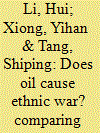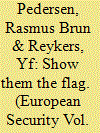| Srl | Item |
| 1 |
ID:
153174


|
|
|
|
|
| Summary/Abstract |
This article contributes both empirically and methodologically. Empirically, we seek to advance our understanding of an important puzzle: does oil cause ethnic war? Methodologically, we seek to identify more precisely the different weaknesses and strengths of the quantitative approach and case studies with process-tracing by explicitly comparing results from these two approaches on the same empirical question. We thus subject the statistical association between the ethnogeographical location of oil and the onset of ethnic war to test with process-tracing. Examining several pathway cases, we find that oil has rarely been a deep cause of ethnic war. Instead, the ethnogeographical location of oil either reignites dormant conflict that has deeper roots in ethnic resentment and hatred or intensifies ongoing conflict, mostly by facilitating the operation of two interconnected mechanisms. Our study echoes the notion that quantitative exercises alone often cannot establish specific causal mechanisms or how contextual factors impact the operation of these mechanisms, and it is precisely on these two key fronts that qualitative exercises possess critical advantages. Hence, quantitative methods and qualitative methods are complementary rather than competitive. Our study also yields important policy implications for preventing and managing ethnic conflict in countries with rich mineral resource.
|
|
|
|
|
|
|
|
|
|
|
|
|
|
|
|
| 2 |
ID:
160935


|
|
|
|
|
| Summary/Abstract |
Is the United Nations Security Council (UNSC) capable and willing to hold accountable the forces which it authorizes? Although it is an often-voiced recommendation that the UNSC should step up its accountability efforts, such as by installing more strict reporting requirements to avoid mission creep, evaluations of the effectiveness thereof remain largely absent. This article suggests that a combination of process-tracing methods with insights from principal–agent theorization allows for systematically evaluating the UNSC’s efforts and capacity to hold accountable non-UN-led forces which it authorizes with a forceful mandate. Such an approach makes it possible to evaluate the causal relevance of particular accountability mechanisms, including reporting requirements, for avoiding mission creep. This is illustrated by an analysis of the NATO-led intervention in Libya of 2011. It is shown how a process-tracing assessment can lead to conclusions about the ineffectiveness of reporting requirements when a permanent member is involved in mandate implementation. The article concludes by calling for more systematic research into the importance of the implementer’s identity for explaining UNSC accountability efforts towards non-UN-led forces.
|
|
|
|
|
|
|
|
|
|
|
|
|
|
|
|
| 3 |
ID:
173942


|
|
|
|
|
| Summary/Abstract |
Why do small states actively contribute to US- and NATO-led military operations? The small state literature has recently developed a novel explanation, referring to their dependency upon the alliance hegemon. The logic is that the small states aim to improve their status and reputation in order to remain relevant and to receive protection. This article contributes to this literature by moving away from this fear of abandonment motivation towards more positive status incitements. It shows how such status motives actually guide and shape small states’ military contributions in US- or NATO-led operations. It does so by using recent innovations in process-tracing methodology to create a status-seeking mechanism. Using the case of Belgium’s participation in the military coalition against ISIL, this article goes beyond the usual Scandinavian suspects in the small state literature and demonstrates that status motivations have relevance for a wider group of small states.
|
|
|
|
|
|
|
|
|
|
|
|
|
|
|
|